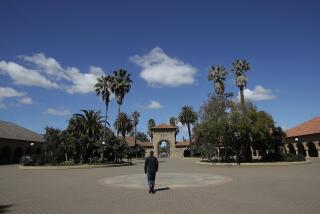Art and science of college admissions
- Share via
Re “Why the best schools can’t pick the best kids -- and vice versa,” Current, March 18
Barry Schwartz may be partly right in that there is no hard science to college admissions, but calling the work I do a crapshoot is offensive. Selective college admissions is about shaping a community. Making admission decisions among thousands of qualified applications for just a few classroom seats is, like a lot of things in life, mostly about gut instinct and life experience. We also consider evidence, both quantifiable and anecdotal, of what works at our institution and build a class that will both benefit from and bring benefit to the campus at large.
Call me a dream killer. Call me an insensitive jerk. But please don’t diminish the importance of the professional, intellectual and emotional investment my admissions colleagues and I do in this process by equating its relevance to a raffle drawing.
GREG MCCANDLESS
Claremont
The writer is associate director of admission at Harvey Mudd College.
*
If the public only knew why the “best” schools might not be best, the admissions rat race might ease. My student graduated summa cum laude from one of the “best” schools. She was not admitted to a doctoral program because that school did not provide her with research experience as an undergraduate. She came to my lab, did a beautiful piece of published research and now is in a molecular biology doctoral program at Yale. Many of the so-called best schools give short shrift to undergraduates while catering to graduate students and postdoctoral fellows.
STEVEN B. OPPENHEIMER
Professor and director
Center for Cancer and
Developmental Biology
Cal State Northridge
*
As a university professor for 25 years and the parent of two daughters who have recently gone through the college admissions process, I agree completely with Schwartz’s proposal to turn admissions decisions among those students considered “good enough” into a lottery. Another point in favor of his proposal that needs emphasizing is that the way things are now, those decisions are largely based on packaging, and that is where paid college admissions counselors come into play.
After the experience of our older daughter, we decided we had better hire a college admissions counselor for the younger one. It made a big difference, and there is something regrettable about that. Ironically, our older daughter was recently accepted to graduate school by two universities that rejected her for undergraduate studies but accepted her younger sister.
PAUL HOFFMAN
Irvine






